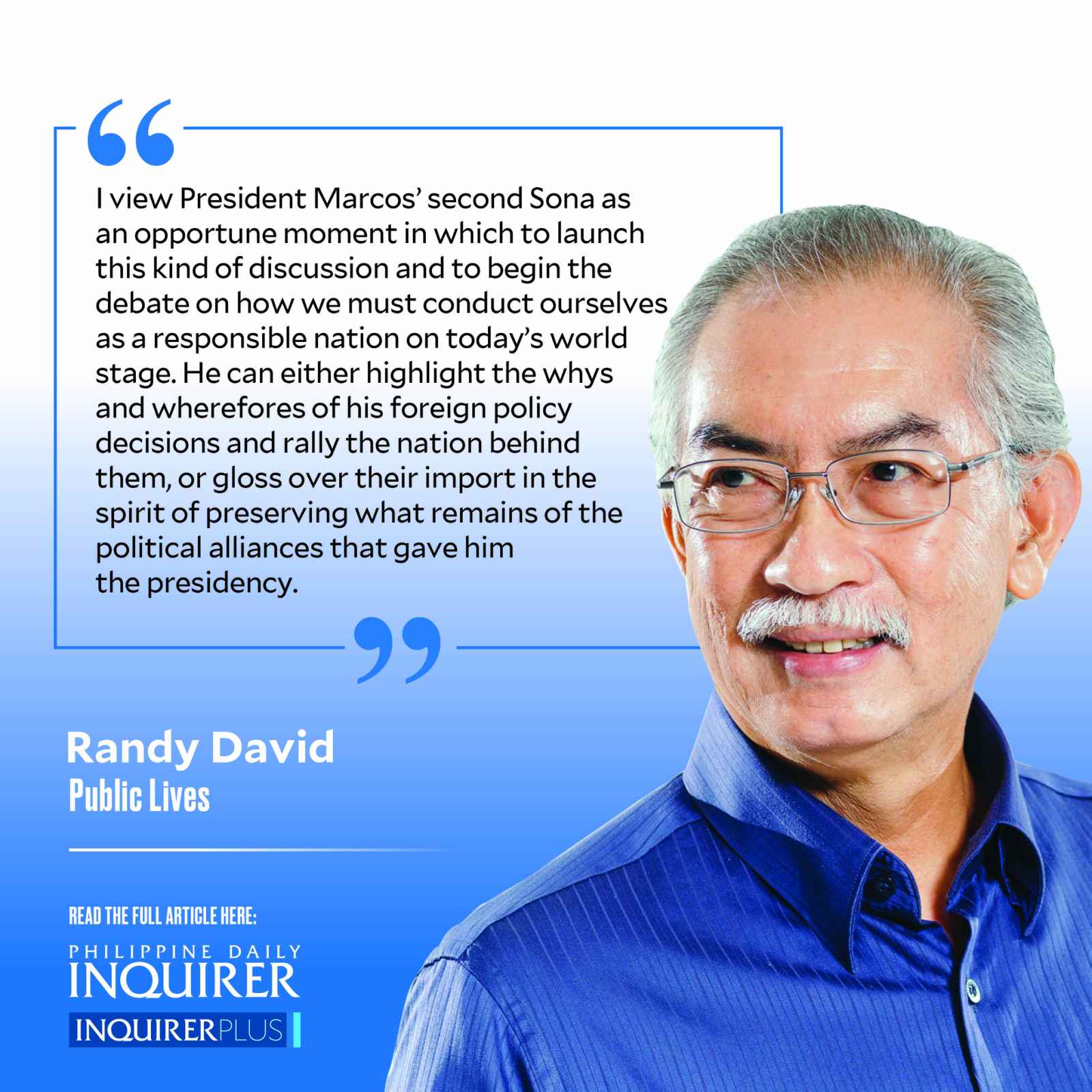
The one thing I am eager to see in President Marcos’ second State of the Nation Address (Sona) is how he will tackle the momentous shift in the country’s foreign policy that has happened during the first year of his presidency. For one cannot think of any policy turn in the past year that is as visible and as consequential as the sharp reversal of his immediate successor’s resolute anti-American tone and obsequious pivot to China.
Within only a year, this policy shift paved the way for the massive return of US forces to our shores in the form of expanded joint military exercises and the positioning of American military personnel and equipment in multiple sites inside our country. All these were accomplished without the benefit of a new bases treaty as mandated by the Constitution, but merely by invoking the general terms of the 1951 Mutual Defense Treaty and the piecemeal agreements (the Visiting Forces Agreement and the Enhanced Defense Cooperation Agreement) that were forged under its auspices.
Indeed, Mr. Marcos has achieved more for America than what analysts imagined a Robredo presidency might have done in such a short time. He has brought back the Philippines to the firm security embrace of America, something that previous administrations had not found easy to execute in the light of the Philippine Senate’s 1991 rejection of a new military bases agreement with the US.
Foreign policy is seldom accorded much space in the typical Sona, a reflection of the fact that the conduct of foreign relations has rarely been a big issue in our elections, nor does it figure in any significant way in the assessment of presidential performance. What may bring it to the fore of this year’s Sona, however, is the note of urgency and alarm that has been created by Rodrigo Duterte’s recent visit to China, where he was received by no less than China’s President Xi Jinping.
Former heads of states normally do not undertake, on their own, such forays into the international arena lest they be seen as trying to play a role that is no longer theirs or, worse, articulating a position that is not consonant with their government’s official views. Basic courtesy is obligatory, unless, of course, the real intention is to openly challenge the pronouncements and actions of the incumbent. But, even in such instances, former presidents take care not to be perceived as criticizing their successors, especially abroad.
Duterte’s recent audience with Xi, in which the Chinese leader praised him for “resolutely [making] the strategic choice to improve relations with China in an attitude of being responsible to the people and to history” and admonished him to “continue to play an important role in the friendly cooperation” between the two countries, is nothing less than a slap on the face of Mr. Marcos. It has no precedent. Not even Mr. Marcos’ admission that he knew about the visit and that he “welcome[s] any new lines of communication,” could remove the sting from that scarcely veiled rebuke.
Filipinos, by now, know that Duterte has never allowed himself to be bound by protocols. But one wonders whether those who continue to look up to him for leadership still think that his policy of obeisance and appeasement of China had led meaningfully to a reduction of tensions in the South China Sea and left us free to exploit the marine resources we consider ours.
But, on the other hand, it is also important to ask if Mr. Marcos’ own pivot to America, in particular the decision to offer additional facilities to US forces which are obviously meant to be mobilized in the event of an invasion of Taiwan, has not needlessly entangled the Philippines in America’s geostrategic designs. There has never been a better moment to discuss the meaning and form of an independent foreign policy than today when world peace is threatened by the palpable risks of a nuclear war.
How should a developing country like ours, whose aspirations are rightly focused on solving once and for all the problem of mass poverty, conduct itself as a responsible party in a region that has fast become a theater of global confrontation between America and China?
If we are conscientious about the role we must play at a time of danger like this, then there is nothing more important than to ensure that the entire nation fully understands what is at stake here and that our people are united behind the decisions of their government and leaders. Such consensus may not come easily. But I am certain it will be greatly facilitated when foreign policy and the country’s international role and responsibilities finally become the proper subject of national discourse and debate.
I view Mr. Marcos’ second Sona as an opportune moment in which to launch this kind of discussion and to begin the debate on how we must conduct ourselves as a responsible nation on today’s world stage. He can either highlight the whys and wherefores of his foreign policy decisions and rally the nation behind them, or gloss over their import in the spirit of preserving what remains of the political alliances that gave him the presidency.
—————-
public.lives@gmail.com